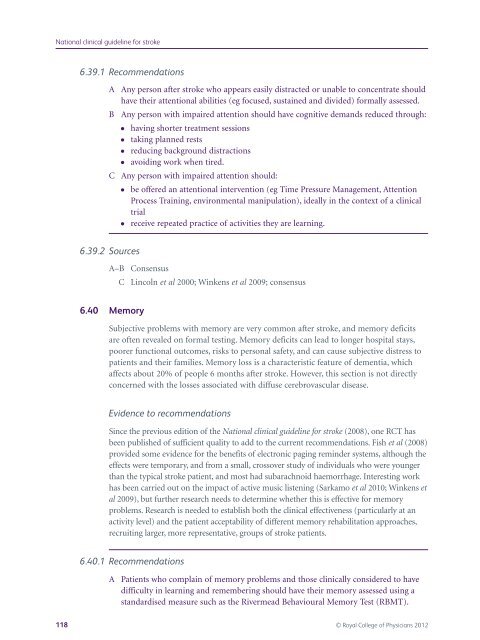national-clinical-guidelines-for-stroke-fourth-edition
national-clinical-guidelines-for-stroke-fourth-edition
national-clinical-guidelines-for-stroke-fourth-edition
Create successful ePaper yourself
Turn your PDF publications into a flip-book with our unique Google optimized e-Paper software.
National <strong>clinical</strong> guideline <strong>for</strong> <strong>stroke</strong><br />
6.39.1 Recommendations<br />
A Any person after <strong>stroke</strong> who appears easily distracted or unable to concentrate should<br />
have their attentional abilities (eg focused, sustained and divided) <strong>for</strong>mally assessed.<br />
B Any person with impaired attention should have cognitive demands reduced through:<br />
● having shorter treatment sessions<br />
● taking planned rests<br />
● reducing background distractions<br />
● avoiding work when tired.<br />
C Any person with impaired attention should:<br />
6.39.2 Sources<br />
● be offered an attentional intervention (eg Time Pressure Management, Attention<br />
Process Training, environmental manipulation), ideally in the context of a <strong>clinical</strong><br />
trial<br />
● receive repeated practice of activities they are learning.<br />
A–B Consensus<br />
C Lincoln et al 2000; Winkens et al 2009; consensus<br />
6.40 Memory<br />
Subjective problems with memory are very common after <strong>stroke</strong>, and memory deficits<br />
are often revealed on <strong>for</strong>mal testing. Memory deficits can lead to longer hospital stays,<br />
poorer functional outcomes, risks to personal safety, and can cause subjective distress to<br />
patients and their families. Memory loss is a characteristic feature of dementia, which<br />
affects about 20% of people 6 months after <strong>stroke</strong>. However, this section is not directly<br />
concerned with the losses associated with diffuse cerebrovascular disease.<br />
Evidence to recommendations<br />
Since the previous <strong>edition</strong> of the National <strong>clinical</strong> guideline <strong>for</strong> <strong>stroke</strong> (2008), one RCT has<br />
been published of sufficient quality to add to the current recommendations. Fish et al (2008)<br />
provided some evidence <strong>for</strong> the benefits of electronic paging reminder systems, although the<br />
effects were temporary, and from a small, crossover study of individuals who were younger<br />
than the typical <strong>stroke</strong> patient, and most had subarachnoid haemorrhage. Interesting work<br />
has been carried out on the impact of active music listening (Sarkamo et al 2010; Winkens et<br />
al 2009), but further research needs to determine whether this is effective <strong>for</strong> memory<br />
problems. Research is needed to establish both the <strong>clinical</strong> effectiveness (particularly at an<br />
activity level) and the patient acceptability of different memory rehabilitation approaches,<br />
recruiting larger, more representative, groups of <strong>stroke</strong> patients.<br />
6.40.1 Recommendations<br />
A Patients who complain of memory problems and those <strong>clinical</strong>ly considered to have<br />
difficulty in learning and remembering should have their memory assessed using a<br />
standardised measure such as the Rivermead Behavioural Memory Test (RBMT).<br />
118 © Royal College of Physicians 2012


